Competence Center MEYER NEPTUN Engineering
MEYER NEPTUN Engineering is the new competence center for special purpose ships
„It is an investment in the future of Germany as a shipbuilding location as a whole,“ says Malte Poelmann, Managing Director of MEYER NEPTUN Engineering and Chief Technology Officer of the MEYER Group.
Not only the cruise industry is waiting for further developments for low-emission, climate-friendly and last but not least energy-efficient new developments. The focus is therefore also on the development of climate-friendly propulsion systems, plus sustainable solutions as retrofits for existing fleets, research vessels and offshore facilities.
Malte Poelmann: „In all these areas, we are striving for innovation leadership – worldwide.“
The future competence center in Rostock combines work on sustainable future solutions with simultaneously very high job security, a modern work organization in an international network.
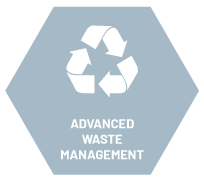
Advanced Waste Management
For the highest environmental standards:
In the area of our environmental management, waste management is one of the important adjusting screws for improving the environmental balance and establishing our environmental standards.
It is primarily the packaging and transport protection materials of the individual items of equipment in production that are important in waste management. When selecting materials, the sustainability factor is becoming an increasingly important criterion. We are working full steam ahead to make waste disposal even more ecological and economical as well.
The Rostock site of the MEYER Group is already ISO 14001 certified. The international seal for recognized environmental management distinguishes the planning, implementation, control and improvement of environmental performance.
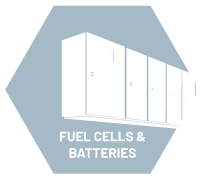
Fuel Cells + Batteries
Revolutionizing shipping: through our research in fuel cell technology.
The AIDAnova will receive a fuel cell system consisting of two systems with an output of approximately 200 kW. The fuel cells, which generate hydrogen from a methanol-water mixture and release electricity in the hydrogen-oxygen reaction, feed it directly into the ship’s grid. This first test installation of a fuel cell system on a cruise ship is a milestone in cruise technology.
Our team is conducting parallel research on an alternative energy system for cruise ships to be developed with a combination of a solid oxide fuel cell (SOFC) and a battery using LNG.
In addition to ocean shipping, we are developing intensively for river shipping: we are working on the use of fuel cells on river cruise ships. The aim is to convert the entire energy supply on board to environmentally friendly hybrid technologies.
We see the opportunity for emission-neutral energy generation in shipping and are working daily on the innovations of tomorrow.
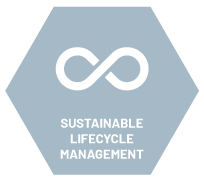
Sustainable Lifecycle Management
Setting the course for the future today:
Our focus is on the entire lifecycle of our products. As early as the prototype development stage, possible adjustments to the ships during their lifetime and final disposal are essential for decision-making.
To enable us to retrofit aging ships smartly and sustainably, we are developing convertible concepts for ship types and looking for innovative materials in production.
Other topics of the future: collecting CO2 emissions on board and recycling them, developing low-energy cabins with decentralized air conditioning and recyclable materials, or producing innovative steel materials with a lower carbon footprint.
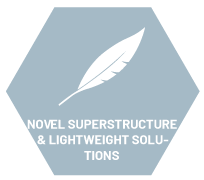
Novel superstructure + Light Weight solutions
Sustainable building processes and structures: We want to exploit all possibilities technologically to create novel, innovative ship structures.
The use of materials of the future is a core theme here. Lightweight materials save weight and thus work energy. But what do they need to be like to meet the requirements of shipbuilding?
We are researching specific bio-based fiber composites and their suitability for load-bearing ship structures in new shipbuilding concepts. Another project is developing a lightweight construction system for different types of ships to increase material utilization and manufacturing efficiency.
This is how innovative shipbuilding works today.
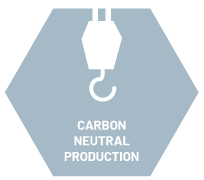
Carbon neutral production
Not only the „green ship“, but also the „green shipyard“:
We are fully committed to the goal of CO2-neutral production. To this end, we are examining processes at the MEYER Group’s shipyards to develop feasible concepts and a roadmap for implementation – and are now setting the course for carbon neutrality.
Based on the actual balance sheet, our project team of internal and external experts is looking at topics such as emissions at our shipyards, the origin of energy, but also suppliers and their processes, as well as numerous individual topics ranging from the operation of the vehicle fleet to climate-friendly everyday work.
Not only sustainable construction processes at the shipyards are relevant, we also stand for the goal of holistic safe, clean and sustainable shipping: from the planning to the operation of a ship. To this end, we conduct research into processes, procedures and input products in order to apply technical, operational and innovative measures for CO2-neutral production of ships.
For the shipping industry. For the future.
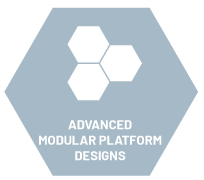
Advanced modular platform designs
The production concept: to be able to build all our ship types efficiently and with the shortest possible distances.
A basic platform for several ship types is the foundation of our production. We are constantly improving processes and, for example, ensuring a better, faster, more efficient and more punctual supply of materials through a new logistics center.
The highest environmental standards are already expected in production. We are constantly looking at environmentally relevant processes – such as all welding, grinding and firing work, coating and cleaning work, as well as ship testing and commissioning – in order to become more climate-neutral and CO2-neutral, and to demonstrate maximum efficiency.
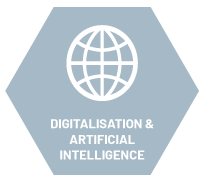
Digitalisations + Artificial Intelligence
Course Industry 4.0: Planning, processing and control run digitally and highly automated.
Through artificial intelligence in system integration, we would like to be able to predict the optimal operating state in the future and adjust it to the entire system ship.
In quality management, the use of the Quentic software offers the possibility of mapping the overall view and details of material and energy input and output in production. A tool that can already be used to make production more efficient and sustainable.
The use of digital technologies and processes for production and products is the prerequisite for us – we work innovatively and technologically on the innovations of tomorrow.
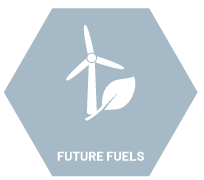
Future Fuels
Shipping on the way to becoming a green industry:
We believe that only with the help of alternative and environmentally friendly fuels can we transform the cruise industry into a green industry. We are working with and researching fuels of the future to achieve climate neutrality and minimize environmental impact.
Various research projects focus on the climate-neutral ship: for example, using hydrogen as well as other renewable fuels, such as methanol, as fuel for new and existing cruise ships and other ship types. For inland shipping, we are also working on converting from diesel to ethanol operation.
Together with the Leibniz Institute for Catalysis (LIKAT) in Rostock, we want to develop green fuels for shipping using the power-to-liquid process and bring them to market maturity.
We have already been able to successfully implement the reduction of emissions in our ships. Our order book exclusively includes ships using LNG as fuel.
Safety
For clean, sustainable and safe shipping:
We take responsibility and see our task as an innovation leader also in increasing safety – already in production and subsequently at sea.
In our projects and through our research, we ensure greater safety for passengers and crew as well as in the construction of the ship. Currently, one project is looking at working with high-power lasers that can quickly and efficiently join sheets 12 to 30 millimeters thick. We are developing protective measures to ensure that this laser operation can be safely integrated into our shipyard’s production.
Another research project is investigating the worst-case scenario: What should be done if a ship springs a leak? The knowledge gained will be passed on to the UN’s International Maritime Organization (IMO).
Green, sustainable, smart and safe. The values for our work and research at the Rostock Competence Center.